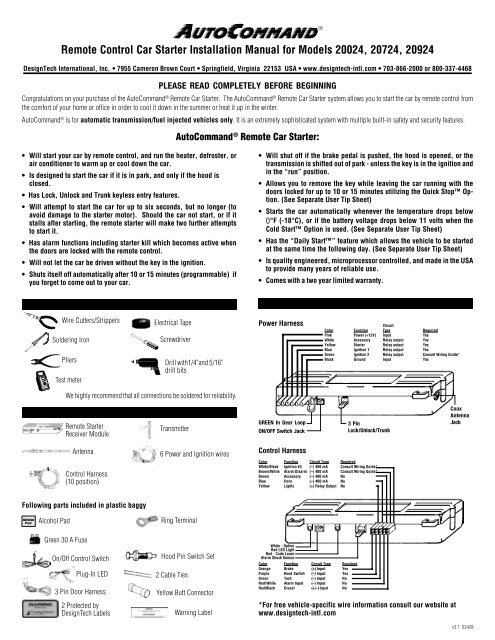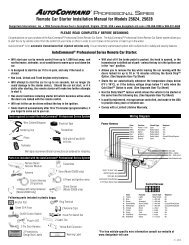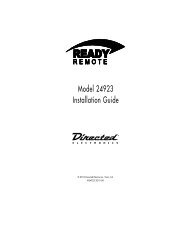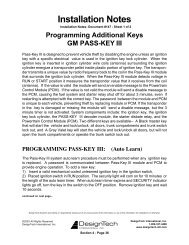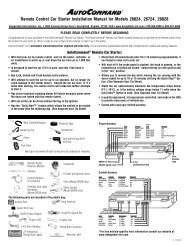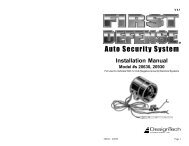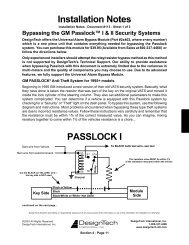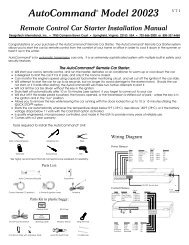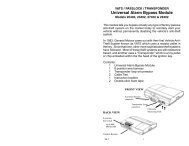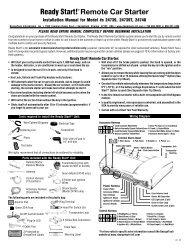Remote Control Car Starter Installation Manual for ... - Ready Remote
Remote Control Car Starter Installation Manual for ... - Ready Remote
Remote Control Car Starter Installation Manual for ... - Ready Remote
Create successful ePaper yourself
Turn your PDF publications into a flip-book with our unique Google optimized e-Paper software.
<strong>Remote</strong> <strong>Control</strong> <strong>Car</strong> <strong>Starter</strong> <strong>Installation</strong> <strong>Manual</strong> <strong>for</strong> Models 20024, 20724, 20924<br />
DesignTech International, Inc. • 7955 Cameron Brown Court • Springfield, Virginia 22153 USA • www.designtech-intl.com • 703-866-2000 or 800-337-4468<br />
PLEASE READ COMPLETELY BEFORE BEGINNING<br />
Congratulations on your purchase of the AutoCommand ® <strong>Remote</strong> <strong>Car</strong> <strong>Starter</strong>. The AutoCommand ® <strong>Remote</strong> <strong>Car</strong> <strong>Starter</strong> system allows you to start the car by remote control from<br />
the com<strong>for</strong>t of your home or office in order to cool it down in the summer or heat it up in the winter.<br />
AutoCommand ® is <strong>for</strong> automatic transmission/fuel injected vehicles only. It is an extremely sophisticated system with multiple built-in safety and security features.<br />
AutoCommand ® <strong>Remote</strong> <strong>Car</strong> <strong>Starter</strong>:<br />
• Will start your car by remote control, and run the heater, defroster, or<br />
air conditioner to warm up or cool down the car.<br />
• Is designed to start the car if it is in park, and only if the hood is<br />
closed.<br />
• Has Lock, Unlock and Trunk keyless entry features.<br />
• Will attempt to start the car <strong>for</strong> up to six seconds, but no longer (to<br />
avoid damage to the starter motor). Should the car not start, or if it<br />
stalls after starting, the remote starter will make two further attempts<br />
to start it.<br />
• Has alarm functions including starter kill which becomes active when<br />
the doors are locked with the remote control.<br />
• Will not let the car be driven without the key in the ignition.<br />
• Shuts itself off automatically after 10 or 15 minutes (programmable) if<br />
you <strong>for</strong>get to come out to your car.<br />
• Will shut off if the brake pedal is pushed, the hood is opened, or the<br />
transmission is shifted out of park - unless the key is in the ignition and<br />
in the “run” position.<br />
• Allows you to remove the key while leaving the car running with the<br />
doors locked <strong>for</strong> up to 10 or 15 minutes utilizing the Quick Stop Option.<br />
(See Separate User Tip Sheet)<br />
• Starts the car automatically whenever the temperature drops below<br />
0°F (-18°C), or if the battery voltage drops below 11 volts when the<br />
Cold Start Option is used. (See Separate User Tip Sheet)<br />
• Has the “Daily Start” feature which allows the vehicle to be started<br />
at the same time the following day. (See Separate User Tip Sheet)<br />
• Is quality engineered, microprocessor controlled, and made in the USA<br />
to provide many years of reliable use.<br />
• Comes with a two year limited warranty.<br />
Tools required to install the AutoCommand ® Unit:<br />
Wiring Diagram<br />
Wire Cutters/Strippers<br />
Soldering Iron<br />
Pliers<br />
Test meter<br />
Electrical Tape<br />
Screwdriver<br />
Drill with1/4”and 5/16”<br />
drill bits<br />
Power Harness<br />
Circuit<br />
Color Function Type Required<br />
Pink Power (+12V) Input Yes<br />
White Accessory Relay output Yes<br />
Yellow <strong>Starter</strong> Relay output Yes<br />
Blue Ignition 1 Relay output Yes<br />
Green Ignition 2 Relay output Consult Wiring Guide*<br />
Black Ground Input Yes<br />
We highly recommend that all connections be soldered <strong>for</strong> reliability.<br />
Parts List included with the AutoCommand ® Unit:<br />
<strong>Remote</strong> <strong>Starter</strong><br />
Receiver Module<br />
Transmitter<br />
GREEN In Gear Loop<br />
ON/OFF Switch Jack<br />
3 Pin<br />
Lock/Unlock/Trunk<br />
Coax<br />
Antenna<br />
Jack<br />
Antenna<br />
<strong>Control</strong> Harness<br />
(10 position)<br />
6 Power and Ignition wires<br />
<strong>Control</strong> Harness<br />
Color Function Circuit Type Required<br />
White/Black Ignition #3 (–) 400 mA Consult Wiring Guide*<br />
Brown/White Alarm Disarm (–) 400 mA Consult Wiring Guide*<br />
Brown Accessory (–) 400 mA No<br />
Blue Horn (–) 400 mA No<br />
Yellow Lights (+) Relay Output No<br />
Following parts included in plastic baggy<br />
Alchohol<br />
Pad<br />
Alcohol Pad<br />
Ring Terminal<br />
Green 30 A Fuse<br />
On/Off <strong>Control</strong> Switch<br />
Hood Pin Switch Set<br />
Plug-In LED<br />
2 Cable Ties<br />
3 Pin Door Harness Yellow Butt Connector<br />
White - Option<br />
Red LED Light<br />
Red - Code Learn<br />
Alarm Shock Sensor<br />
Color Function Circuit Type Required<br />
Orange Brake (+) Input Yes<br />
Purple Hood Switch (–) Input Yes<br />
Green Tach (–) Input No<br />
Red/White Alarm Input (–) Input No<br />
Red/Black Diesel (+/-) Input No<br />
2 Protected by<br />
DesignTech Labels<br />
Warning Label<br />
*For free vehicle-specific wire in<strong>for</strong>mation consult our website at<br />
www.designtech-intl.com<br />
v3.1 S2428
On cars with airbags, you may notice bright yellow tubes or harnesses<br />
marked SRS (Supplemental Restraint System) underneath the steering<br />
column area. DO NOT tamper with these wires in any way, to prevent<br />
personal injury and/or damage to the air bag system.<br />
Battery gases are explosive.<br />
Do not smoke while working near the car’s battery.<br />
Note: Some installers connect a battery charger to the vehicle’s battery during<br />
installation. This is fine, but it must be removed be<strong>for</strong>e running the vehicle under<br />
remote starter control.<br />
All General Motors (GM), rear wheel drive vehicles built prior to 1995<br />
with automatic transmissions and Dodge Dakota trucks (4 cylinder<br />
engines only) with automatic transmissions built prior to 1996 have a<br />
MECHANICAL TYPE of NEUTRAL SAFETY SWITCH. See important<br />
warning on the last page of these instructions.<br />
When running the wires through the car’s firewall, be sure to protect<br />
them from sharp metal edges and from hot surfaces on and around the<br />
engine.<br />
INSTALLATION INSTRUCTIONS<br />
1. Be<strong>for</strong>e You Start<br />
Take time to read through the whole installation manual be<strong>for</strong>e beginning.<br />
Always leave a window open to avoid locking your keys in your car.<br />
IMPORTANT: After having read the entire manual, start the installation<br />
by putting the yellow WARNING STICKER in the engine compartment.<br />
Choose a surface that is clean and readily visible when the hood is open.<br />
WARNING<br />
This car is equipped with a remote control starting device.<br />
Disable be<strong>for</strong>e working on car!<br />
AVERTISSEMENT<br />
Ce véhicule est équipé d’un systéme de démarrage a distance. Mettez-le<br />
hors fonction avant d’eflectuer toute opération d’entretien ou de réparation!<br />
POWER & IGNITION HARNESS<br />
The remote starter module will be installed under the dash once all wiring has been<br />
completed. Do not mount the module at this time! You will need to check<br />
the red diagnostic LED light as the installation progresses. Locate (or<br />
drill) a hole in the firewall to run the PURPLE and GREEN wires of the <strong>Control</strong><br />
Harness and the PINK wire of the Power Harness into the engine compartment.<br />
The remaining short wires stay in the passenger area. Leave about a foot of the wire<br />
harness under the dash <strong>for</strong> ease of working and visual access to the diagnostic light.<br />
The <strong>Installation</strong> In<strong>for</strong>mation section of our web site www.designtech-intl.com is<br />
available 24 hours/day to provide you with free, up-to-date vehicle wiring in<strong>for</strong>mation<br />
<strong>for</strong> your particular vehicle after you log in.<br />
Note: Always connect the PINK and BLACK wires be<strong>for</strong>e connecting any of the<br />
other wires. Do not insert the fuse until step 11.<br />
2. Black Wire (16 AWG) – Ground<br />
Connect the BLACK wire to a very good, clean chassis ground in the driver’s kick<br />
panel area. Use the small ring terminal. (The thin metal bracing around or beneath<br />
the dash board is not always adequate.)<br />
3. Pink Wire (12 AWG) – Power (+12 Volts)<br />
Connect the ring terminal at the end of the short PINK wire to the +12 Volt terminal of<br />
the battery. Run the long PINK wire through the firewall of your vehicle. Join the<br />
remaining ends of the power wire together by soldering them. Tape with electrical<br />
tape to leave no exposed wires. Alternatively, you may wish to use the yellow butt<br />
connector, but we recommend soldering. Wait to insert the 30 amp green fuse into<br />
the holder until step 11. As the power is first applied to the unit the red diagnostic<br />
LED light will blink once.<br />
Note: Failure to properly install the fuse holder and 30 amp fuse to the PINK wire to<br />
the battery voids all product warranties.<br />
Ignition Key Diagram <strong>for</strong> Steps 4-7<br />
The vehicle’s wires are found coming off of the key switch.<br />
Remove the panel under the steering column to access<br />
these wires.<br />
4. Blue Wire (14 AWG) – Ignition 1<br />
Connect the BLUE wire to the ignition 1 wire of your vehicle. This wire will measure<br />
+12 Volts on the test meter in the “run” and “start” position, and is off in the “lock/<br />
off” and “accessory” positions.<br />
5. Green (14 AWG) – Ignition 2<br />
Connect the GREEN wire to the Ignition 2 wire in the vehicle. The Ignition 2 wire can<br />
function in several different ways in your vehicle. It is important to understand how it<br />
works. The Ignition 2 wire will usually measure +12 Volts in the “run” position and is<br />
off (ground) in the “lock/off” and “accessory” positions. In certain vehicles, it may<br />
also show +12 Volts in the “Start” position or Ignition 2 may turn OFF during “Crank”<br />
and turn back ON after the starter disengages. <strong>Car</strong>efully note the function of the Ignition<br />
2 wire. If the Ignition 2 turns OFF during “Crank”, set Option #4 (in section 24). If<br />
Ignition 2 stays ON during “Crank,” no options need to be changed.<br />
6. White Wire (14 AWG) – Accessory<br />
Connect the WHITE wire to the accessory wire which is +12 Volts in the “run” and<br />
“accessory” position, but off in the “start” and “off” positions. In GM vehicles, connect<br />
the white wire to the orange wire that is hot in “run” only.<br />
7. Yellow (14 AWG) – <strong>Starter</strong><br />
Connect the YELLOW wire to the starter wire. This wire will measure +12 Volts on<br />
the test meter in the “start” position only.<br />
Note: Most Nissan vehicles have two starter wires. Connect both starter wires of the<br />
vehicle to the YELLOW start wire of the remote starter.<br />
8A. Plug-In On/0ff Switch<br />
Mount the control switch so that it is easily accessible and so that<br />
the “ON” position is facing upward. Make sure there is enough clearance behind the<br />
mounted switch <strong>for</strong> the wire connections. Do not let the switch wires touch ground.<br />
Do not plug the switch into the unit until it is mounted first. Connection of this switch<br />
is mandatory. Use a 1/4" drill-bit <strong>for</strong> the mounting hole.<br />
Plug the ON/OFF control switch into the module just to the right of the power wires.<br />
Turn the switch on.<br />
8B. Plug-In LED Light<br />
Drill a 5/16" hole in to the dash or panel to mount the LED light and plug the LED<br />
light plug into the red connector. Mounting the LED light is not mandatory but the<br />
LED light is used <strong>for</strong> alarm status, troubleshooting and programming options.<br />
CONTROL HARNESS<br />
ALL WIRES ARE THE SMALLER 18 AWG SIZE<br />
9. Purple Wire – Hood Pin Switch – <strong>Control</strong> Harness<br />
The hood pin switch MUST be installed with the remote starter. It prevents operation<br />
of the remote starter when the hood is open and is used to initialize the unit. Connect<br />
the PURPLE wire to the hood pin switch using the red<br />
connector.<br />
Note: If you already have a hood pin switch which is<br />
being used by a car alarm system, you may share the<br />
wiring – but be sure to diode isolate each wire going to<br />
the hood pin switch with the bands of diodes pointing<br />
towards the pin switch as shown at right.<br />
To Alarm<br />
To <strong>Remote</strong> <strong>Starter</strong><br />
How to share a hood pin<br />
switch with an alarm<br />
v3.1 2428<br />
2
10. Orange Wire – Brake Shut-off – <strong>Control</strong> Harness<br />
Connect the ORANGE wire to the brake wire which receives +12 Volts when the brake<br />
pedal is depressed. This wire must be connected. It arms a critical safety feature<br />
which disables the remote starter when the brake pedal is depressed.<br />
Note: In some cars, the ignition must be in the “on” position to test the power in the<br />
brake wire.<br />
Note: If the Ignition 1 and Ignition 2 wires come on whenever the brake is depressed<br />
and the hood is open this just means you need to initialize the unit in section 11.<br />
11. Initializing the <strong>Remote</strong> <strong>Starter</strong><br />
BEFORE THE UNIT WILL DO ANYTHING FOR THE FIRST TIME, YOU MUST INITIALIZE<br />
THE REMOTE STARTER<br />
A. Insert the 30 amp fuse into the fuse holder on the large PINK wire.<br />
B. Turn the control switch on.<br />
C. The remote starter requires the installer to open the hood and then press and<br />
hold the brake pedal. Note: The ignition/dash lights will come on if the unit is<br />
not initialized.<br />
D. While depressing the brake (with the engine off and the hood open) turn the<br />
ignition key to the “RUN” (not “start”) position.<br />
E. Put the car in “DRIVE” from the “PARK” position.<br />
F. Put the car back in “PARK” and release the brake.<br />
G. Turn the key off and remove the key.<br />
Note: Confirm initialization by turning the ON/OFF control switch “OFF” and then<br />
“ON”. The red LED light on the remote start module will flash once immediately as<br />
the switch is flipped from the “OFF” to the “ON” position.<br />
If the red LED light did not flash when the control switch was turned “ON” REPEAT<br />
STEPS A THROUGH G. See the colored Trouble Shooting Sheets if necessary.<br />
12A. Green Wire – Tach Input – <strong>Control</strong> Harness<br />
The remote starter has two ways of monitoring the car during<br />
the starting process. Both ways will ensure a clean, accurate start. Read about<br />
both methods be<strong>for</strong>e deciding which one to use. Normally you should<br />
try the “No Tach ” method first.<br />
“No Tach ” Starting<br />
This starting method does not require the connection of the GREEN tach wire. This<br />
method will start the car by reading the car’s voltage be<strong>for</strong>e attempting to start, and<br />
then looking <strong>for</strong> a voltage increase when the alternator kicks in. This feature<br />
automatically takes into account voltage, temperature, and the time since the vehicle<br />
was last run. The “No-Tach ” starting is preset at the factory and you can skip step<br />
12B if you would like to use it. Note that if the vehicle is hard to start, set Option #3<br />
(section 24) <strong>for</strong> “extended crank.”<br />
Tachometer sensing<br />
If the vehicle is generally hard to start (i.e. requiring a cranking time of more than 1<br />
second) you will get more accurate starting with the tachometer sensing starting<br />
method. This method starts the car by reading the engine speed (tach) in<strong>for</strong>mation<br />
from a wire under the hood. If you choose tachometer sensing, connect the GREEN<br />
(18 awg) wire to the car’s tach wire under the hood (normally the negative side of the<br />
coil or tach output of coil pack). After you have connected the GREEN wire, you need<br />
to teach the remote starter the vehicle’s tach rate at idle. Proceed to step 12B.<br />
Note: You must have already initialized the remote starter from Step 11.<br />
12B. Tach Rate Learning<br />
Note: Only use if the tachometer sensing method is chosen.<br />
A. Connect the GREEN wire to the car’s tach wire under the hood.<br />
B. Turn the On/Off control switch to the “OFF” position. Wait 5 seconds <strong>for</strong> the red<br />
LED light flashes to stop.<br />
C. Program the unit to the tach mode by pushing the White “option” button once<br />
and watching the red LED light flash. Now push the start button on the transmitter<br />
<strong>for</strong> a second until you see the red LED light flash again. You are now in TACH<br />
mode. (If the red LED light flashed twice or sometimes three times – simply push<br />
the transmitter button again until you get only one flash).<br />
D. Wait 5 seconds <strong>for</strong> the red LED light to flash 3 times.<br />
E. Turn the On/Off control switch back to the “ON” position<br />
F. Start the car with the key and let it get to a normal idle. Do not press on the gas<br />
pedal.<br />
G. Push the red “code learn” button <strong>for</strong> a second.<br />
H. Watch the red LED light. It will come on after 3 or 4 seconds, indicating that the<br />
tach idle rate has been learned.<br />
I. Turn the key to the “Lock/Off” position. You are now finished.<br />
Note: Once these steps are complete – you cannot use the LED to confirm tach again.<br />
You can however repeat the above steps to learn tach over again at any time.<br />
OPTIONAL STEPS<br />
13. Yellow Wire – Headlights/Parking Lights – <strong>Control</strong> Harness<br />
Connection of the YELLOW wire allows you to activate the low beam headlights<br />
or parking lights <strong>for</strong> remote start and lock status. After the remote starter has<br />
started the car, the lights will remain on until the remote starter shuts off after 10<br />
minutes, or when the brake pedal is pushed, or when the car is put into gear. This is<br />
a relay +12 Volts output. Connect the YELLOW wire to the wire that has power<br />
when the lights are on.<br />
14. Blue – Horn/Siren – <strong>Control</strong> Harness<br />
The BLUE wire signals the horn to honk (or siren to chirp) once each time the remote<br />
starter starts the vehicle and each time the locks are locked or unlocked. Connect the<br />
blue wire to the factory horn wire which is often found running down the steering<br />
column. It will normally show +12 Volts at rest and the voltage will disappear when<br />
the horn is honked. This is<br />
a 400 mA transistor<br />
Positive Horn/Siren Relay<br />
ground output which<br />
MUST drive a relay if<br />
using a siren or<br />
positively triggered<br />
horn. Option #11 (section<br />
24) must be changed when<br />
using a siren.<br />
15. Brown/White – Alarm Disable/<strong>Starter</strong> Kill – <strong>Control</strong> Harness<br />
The BROWN/WHITE wire is Alarm Disable, which will give out a quick negative<br />
pulse just be<strong>for</strong>e starting the vehicle. This wire can be used to turn off the factory<br />
alarm system in vehicles which have them. In most vehicles, this wire is located<br />
in the driver’s kick panel.<br />
Using Option #19 (section 24) you can set this to <strong>Starter</strong> Kill. This option prevents<br />
the vehicle from being<br />
<strong>Starter</strong> Kill Relay<br />
started with the key<br />
when the alarm is<br />
<strong>Starter</strong> Wire<br />
<strong>Starter</strong> Wire<br />
armed. It is also<br />
From Key<br />
Cut<br />
To <strong>Starter</strong><br />
Switch<br />
Motor<br />
active whenever the<br />
87<br />
vehicle is running<br />
<strong>Remote</strong> <strong>Starter</strong><br />
Tap into Blue<br />
Brown / White<br />
IGN1 Wire from<br />
87A<br />
Wire 86 30 85<br />
<strong>Remote</strong> <strong>Starter</strong><br />
under remote starter<br />
control to provide Yellow Start Wire<br />
From <strong>Remote</strong> <strong>Starter</strong><br />
anti-grind protection.<br />
16. White/Black Wire – Ignition #3 – <strong>Control</strong> Harness<br />
The WHITE/BLACK wire, is a ground output that acts just like the Ignition 1 or Ignition<br />
2 relay outputs (active in the “run” and “crank” positions). This wire is a 400 mA<br />
negative transistor output and MUST be set up to power a relay (not<br />
included). It can be used to power the third ignition wire at the key (necessary <strong>for</strong><br />
most Ford vehicles).<br />
This is a wire that can also be used<br />
to bypass a vehicle anti-theft system<br />
by connecting it to the Universal<br />
Alarm Bypass Module. See the<br />
Factory Anti-Theft System section at<br />
the end of the instructions.<br />
Ignition 3<br />
White/Black Wire 87<br />
From<br />
87A<br />
<strong>Remote</strong> <strong>Starter</strong> 85 30<br />
To LARGE 12 Volt<br />
Constant Wire<br />
(Found in Ignition<br />
Switch Wire<br />
Harness)<br />
To Additional<br />
Ignition Wire<br />
(in vehicle)<br />
3 v3.1 2428<br />
86
17A. Yellow and White – Keyless Entry Wires – 3 Wire Harness<br />
The wires function as follows:<br />
YELLOW Negative Trigger – Unlock Positive Trigger – Lock<br />
WHITE Negative Trigger – Lock Positive Trigger – Unlock<br />
Determine the polarity of your door lock system by using a test meter. For NEGATIVE<br />
locks (the lock wire sees a ground signal briefly as the electric locks are locked) –<br />
connect the YELLOW wire to the Unlock wire and the WHITE wire to the Lock wire.<br />
For POSITIVE locks (the lock wire sees a +12 volt signal briefly as the electric locks<br />
are locked but does not see ground when they are inactive) connect the YELLOW<br />
wire to the Lock wire and the WHITE wire to the Unlock wire.<br />
For REVERSING POLARITY (the lock wires sees a +12 volt signal briefly as the electric<br />
locks are locked and sees a ground signal when they are inactive) follow the<br />
diagram below:<br />
v3.1 2428<br />
Lock Relay<br />
Vehicle Lock Wire<br />
(Primary Switch Side)<br />
(Actuator Side)<br />
Cut<br />
To 12 Volt<br />
Constant<br />
(15 Amp Fused)<br />
White Wire<br />
87<br />
From<br />
87A<br />
<strong>Remote</strong> <strong>Starter</strong> 85 30 86<br />
3-pin Harness<br />
Reversing Polarity Door Locks<br />
Unlock Relay<br />
Vehicle Unlock Wire<br />
(Primary Switch Side)<br />
(Actuator Side)<br />
Cut<br />
Yellow Wire<br />
From<br />
<strong>Remote</strong> <strong>Starter</strong><br />
3-pin Harness<br />
87<br />
87A<br />
85 30<br />
86<br />
To 12 Volt<br />
Constant<br />
(15 Amp Fused)<br />
Most VACUUM operated door lock systems require Option #18 (section 24) <strong>for</strong> Long<br />
locks to be set.<br />
17B. Green Wire – Trunk Release – 3 Wire Harness<br />
The GREEN wire is the Trunk Release output which gives out a transistor ground<br />
output when the unlock button is held <strong>for</strong> 4 seconds. Again, this is a 400 mA<br />
transistor ground output which MUST drive a relay (not included).<br />
Negative Trunk Release<br />
Green Wire<br />
87<br />
From<br />
87A<br />
<strong>Remote</strong> <strong>Starter</strong> 85 30<br />
86<br />
Ground (-)<br />
To 12 Volt<br />
Constant<br />
(15 Amp Fused)<br />
To Trunk Release<br />
(in vehicle)<br />
Positive Trunk Release<br />
Green Wire<br />
87<br />
From<br />
87A<br />
<strong>Remote</strong> <strong>Starter</strong> 85 30<br />
86<br />
To 12 Volt<br />
Constant<br />
(15 Amp Fused)<br />
To Positive<br />
Trunk Release<br />
(in vehicle)<br />
18. Brown Wire – Accessory Pulse/Dome Light – <strong>Control</strong><br />
Harness<br />
The BROWN wire is the Accessory Pulse output which gives out a momentary<br />
transistor ground output 10 seconds after the vehicle is remotely started. This is<br />
important in some vehicles to control the defroster or to control the GM R.A.P.<br />
system. Again, this is a 400 mA transistor ground output which MUST<br />
drive a relay (not included).<br />
This BROWN wire can also control a relay <strong>for</strong> Dome Light activation. When Option<br />
#20 (section 24) is changed, this BROWN wire causes the dome light to turn on <strong>for</strong><br />
25 seconds every time the doors are unlocked with the transmitter.<br />
Negative Dome Light<br />
Brown Wire<br />
87<br />
From<br />
87A<br />
<strong>Remote</strong> <strong>Starter</strong> 85 30<br />
86<br />
Ground (-)<br />
To 12 Volt<br />
Constant<br />
(15 Amp Fused)<br />
To Negative<br />
Door Pin<br />
(in vehicle)<br />
Positive Dome Light<br />
(Most Ford Vehicles)<br />
Brown Wire<br />
87<br />
From<br />
87A<br />
<strong>Remote</strong> <strong>Starter</strong> 85 30<br />
To 12 Volt<br />
Constant<br />
(15 Amp Fused)<br />
To Positive<br />
Door Pin<br />
(in vehicle)<br />
19. Red/White Wire – Door Pin Alarm Input – <strong>Control</strong> Harness<br />
The RED/WHITE wire is the Door Pin Alarm Input. This wire will accept any input<br />
that supplies a negative (ground) when activated. (Most door pins go to ground<br />
when the door is open, +12 Volts when closed.)<br />
Most Ford vehicles are positive door pins that switch to +12 Volts when opened, you<br />
will need to reverse the polarity with a relay be<strong>for</strong>e connecting to this RED/WHITE<br />
wire.<br />
86<br />
4<br />
The alarm is “Last door arming.”<br />
You should diode isolate the inputs<br />
of two or more sensors on the same<br />
input wire.<br />
If you choose not to use this alarm<br />
feature then permanently ground this<br />
wire or program “No Alarm” Option<br />
#24 (section 24).<br />
20. Red/Black Wire Diesel “wait to start” <strong>Control</strong> Harness<br />
This wire is only used in diesel vehicle applications – and is optional. This<br />
wire can be hooked up to the “wait to start” light’s switched wire behind the dash.<br />
If Option #9 (section 24) is set, this wire will feed in<strong>for</strong>mation to the remote starter<br />
as to when to crank the vehicle over. This wire is not polarity sensitive.<br />
REQUIRED FINAL STEPS<br />
Door Pin Switch<br />
(in vehicle)<br />
Positive Door Trigger<br />
(Most Ford Vehicles)<br />
87<br />
87A<br />
85 30<br />
Ground (-)<br />
To Red/White Wire<br />
from <strong>Remote</strong> <strong>Starter</strong><br />
Note: You must have hooked up all required wires and completed Initialization<br />
(Step 11) to proceed <strong>for</strong>ward.<br />
21. Trying the Unit Out<br />
WARNING: Be prepared to apply the brake during this testing.<br />
A. Close the hood and fully apply the emergency brake<br />
B. Place the vehicle in Park.<br />
C. Turn the On/Off switch off then on – the red LED light will flash once.<br />
D. Once all the wiring is checked and is correct, press the Start button on the<br />
transmitter.<br />
E. The car should start and continue to run <strong>for</strong> ten minutes. Make sure that the<br />
engine shuts down if the car is shifted out of park, the hood is opened, the brake<br />
is pressed or the start button is pushed again. If the car does not start, see<br />
Special Cases.<br />
22. The Antenna<br />
Feed the antenna around under the dash and up the inside of the right or left<br />
windshield post and over the top of the windshield. Clean the windshield<br />
with the provided alcohol pad <strong>for</strong> maximum adhesion. Let the windshield dry<br />
completely. Peel the liner off the back of the adhesive tape and mount the<br />
antenna behind the rear view mirror. The more exposed the antenna is, the<br />
better the range per<strong>for</strong>mance. Finally, plug the end of the antenna into the<br />
remote starter module. In most vehicles you will get better range per<strong>for</strong>mance<br />
if the antenna is pointing vertically downward from the top of the<br />
windshield.<br />
Note: The wiring section of the installation is now complete. Be sure to<br />
cap all unused wires so as to prevent short circuits, and mount the<br />
module securely under the dash. When tying up and mounting the unit,<br />
be sure to avoid any moving parts (steering column, pedals) and sharp<br />
edges.<br />
23. Trouble Shooting with the Self Diagnostics<br />
The remote starter contains a built in diagnostic routine that will indicate why the<br />
unit started or why the unit turned off the car the last time that the unit was used.<br />
To activate the diagnostic mode <strong>for</strong> why it turned off, simply turn the On/Off<br />
control switch to the “OFF” position. In a few seconds, the red LED light on the<br />
module will flash 1 to 12 times to identify the problem. See the chart below <strong>for</strong> an<br />
explanation of the flashes:<br />
1 flash 10/15 minute time out. Unit should be fine. Make sure transmitter is<br />
working properly.<br />
2 flashes Unit turned off because Brake or Hood was activated. Check to make<br />
sure the hood pin switch is depressed when the hood is closed and<br />
the correct brake wire is hooked up.<br />
3 flashes No Tach or Stalled. Review section 12 and make sure the no tach/tach<br />
wire option is programmed correctly.<br />
4 flashes Received another remote input from the transmitter<br />
86
5 flashes Transmission was shifted into gear. Cut the Green “In Gear Loop.”<br />
See wire diagram on front cover.<br />
6 flashes Low battery voltage, or may be missing an ignition wire which<br />
powers up the alternator<br />
7 flashes Alarm Input triggered<br />
8 flashes Over current – One of the 400 mA (-) transistor outputs (Accessory<br />
Pulse, Alarm Disarm, <strong>Starter</strong> kill, lock, unlock, horn, lights, trunk, or<br />
Ignition 3) of the control harness is drawing too much current. Make<br />
sure to use a relay where necessary.<br />
12 flashes The <strong>Control</strong> Switch was turned off while the starter was running.<br />
For reasons why it last started, simply put your foot on the brake while you turn<br />
the control switch OFF. Keep holding the brake down until the flashes start. The<br />
codes are as follows:<br />
1 flash The unit has not started yet since it was last powered up.<br />
2 flashes Received a radio signal from the transmitter to start.<br />
3 flashes N/A<br />
4 flashes Temp reached 0 o F in vacation mode.<br />
5 flashes Voltage reached 11 volts in Vacation Mode.<br />
6 flashes Received a start command from the remote input RED/BLACK wire.<br />
7 flashes Started from 24 hour Daily Start feature.<br />
24A. Setting Program Features<br />
The remote starter unit has many special features available. You will not need to use<br />
these special features in most situations. The factory settings will operate most<br />
vehicles. You must turn the On/Off control switch to the “OFF” position to<br />
program any features.<br />
Note: When turning off this control switch, the red LED light will flash a few times,<br />
giving the diagnostic code described in section 23. Wait a few seconds <strong>for</strong> it to<br />
finish be<strong>for</strong>e programming your new Options.<br />
Feature Factory Setting Option<br />
Number (2 flashes) (1 flash)<br />
1 “No-Tach” Tach Mode<br />
2 10 Min. Run Time 15 Min. Run Time<br />
3 Normal Crank Extended Crank<br />
4 Normal IGN 2 not active during crank<br />
5 Normal Voltage Metering Ignore Voltage Metering<br />
6 Gasoline vehicles Diesel vehicles<br />
7 “Enable” feature No “Enable”<br />
8 Normal Daytime Running Lights<br />
9 Normal Diesel “Wait to Start”<br />
10 1 sec. alarm disarm pulse 0.45 sec. Alarm disarm pulse<br />
11 Horn Pulsing Siren Constant<br />
12 Chirp with Locks Silent lock/Unlock/Start<br />
13 Active Passive Arming<br />
14 Normal Lock Follow ignition<br />
15 Normal Unlock Follow ignition<br />
16 Normal Double Pulse Lock<br />
17 Normal Double Pulse Unlock<br />
18 Short Locks Long Locks<br />
19 Alarm Disable <strong>Starter</strong> Kill<br />
20 Accessary Pulse Dome Light<br />
21 N/A N/A<br />
22 N/A N/A<br />
23 N/A N/A<br />
24 Alarm Mode No Alarm Mode<br />
25 N/A N/A<br />
26 N/A N/A<br />
27 N/A N/A<br />
28 N/A N/A<br />
29 N/A N/A<br />
30 N/A N/A<br />
31 Reset All Options<br />
24B. Program Features Descriptions<br />
Option #1 No-Tach Tach Mode<br />
This option sets the starting method. The factory setting uses “No-Tach” starting. If<br />
you wish to use the tach to start, follow the instructions in the Tach Rate Learning<br />
(section 12B).<br />
Option #2 10 Min. Run Time 15 Min. Run Time<br />
This option gives you a choice of run times.<br />
Option #3 Normal Crank Extended Crank<br />
This option will add 50% more crank time to the NoTach starting feature.<br />
Option #4 Normal IGN 2 not active during Crank<br />
This option will turn off the Ignition 2 output (thick GREEN wire) during cranking. It<br />
is used to exactly match the remote starter with the ignition key function.<br />
Option #5 Normal Voltage Metering Ignore Voltage Metering<br />
This option is used in the “No-Tach” starting method <strong>for</strong> some diesel vehicles or<br />
vehicles with weak batteries and/or poorly per<strong>for</strong>ming altenators.<br />
Option #6 Gasoline Vehicles Diesel Vehicles<br />
This option must be activated when installing on a diesel vehicle.<br />
Option #7 “Enable” Feature No “Enable”<br />
This option cancels the “enable” mode safety feature. The “enable”<br />
mode requires that the driver toggle the ON/OFF control switch “OFF”<br />
then “ON” each time the driver removes the key from the ignition in<br />
order to “enable” the vehicle <strong>for</strong> remote starter control. This feature<br />
guards against undesired starting of the vehicle by remote control. For<br />
vehicles manufactured prior to 1996, please see the important warning<br />
on the last page of these instructions.<br />
Option #8 Normal Daytime Running Lights<br />
This option will automatically turn the headlights on (<strong>for</strong> safety) about 10 seconds<br />
after it sees the key in the ignition position – and automatically turn the headlights off<br />
when the key is removed from the ignition.<br />
Option #9 Normal Diesel “Wait to Start”<br />
This option will control the time be<strong>for</strong>e cranking the diesel vehicle by looking at the<br />
“wait to start” light of the vehicle. Simply hook the RED/BLACK Input wire of<br />
section 20 up to the wire behind the “wait to start” light. Also set Option #6 (section<br />
24) <strong>for</strong> diesel vehicles.<br />
Option #10 1 sec. Alarm Disarm Pulse 0.45 sec. Alarm Disarm Pulse<br />
This option shortens the Alarm Disarm Pulse from 1 second to 0.45 second. This<br />
feature is very useful with some Dodge/Chrysler vehicles that use a multiplexed<br />
system to disarm the alarm and unlock the doors with the same wire. Using this<br />
feature should eliminate the need to relock the doors after the alarm has been<br />
disarmed and the vehicle is remotely started.<br />
Option #11 Horn Pulsing Siren Constant<br />
This option changes the thin BLUE wire from pulsing output <strong>for</strong> horn to constant<br />
output <strong>for</strong> a siren.<br />
Option #12 Chirp with Locks Silent lock/Unlock/Start<br />
This option will eliminate the chirp with Start, Lock and Unlock.<br />
Option #13 Active Arming Passive Arming<br />
The factory setting of Active Arming requires the owner to actively arm the car with<br />
the remote control. Choosing the option of Passive Arming will cause the vehicle<br />
to automatically arm after the key is removed and the door is closed.<br />
5 v3.1 2428
Option #14 Normal Lock Follow Ignition<br />
Selecting this option will automatically lock the doors when the key is turned on,<br />
doors closed and the brake is depressed.<br />
Option #15 Normal Unlock Follow Ignition<br />
Selecting this option will automatically unlock doors when key is removed from<br />
ignition.<br />
Option #16 Normal Double Pulse Lock<br />
This option will pulse the lock output wire twice instead of once <strong>for</strong> normal mode.<br />
Option #17 Normal Double Pulse Unlock<br />
This option will pulse the unlock output wire twice instead of once <strong>for</strong> normal mode.<br />
Option #18 Short lock pulse Long lock pulse<br />
This option will increase the door lock pulse time from 0.6 second to 3 seconds <strong>for</strong><br />
vehicles with vacuum locking systems (older European vehicles).<br />
Option #19 Alarm Disable <strong>Starter</strong> Kill<br />
The factory setting of Alarm Disable will give you a quick pulse whenever the<br />
transmitter unlocks the doors or the transmitter is used to start the vehicle. The <strong>Starter</strong><br />
Kill option comes on and stays on whenever the remote starter is running or the<br />
alarm is armed. This wire controls a relay which opens up the path of the starter wire<br />
(refer to section 15).<br />
Option #20 Accessory Pulse Dome Lamp<br />
Accessory pulse puts out a brief pulse output after the remote starter starts or stops<br />
the vehicle. When set, this output can be used to turn on a defroster that requires a<br />
momentary pulse or could be used to control GM R.A.P. (retained accessory power)<br />
output. Dome lamp option will turn this output on when you unlock the door <strong>for</strong> 25<br />
seconds. (Refer to section 18).<br />
Option #24 Alarm No Alarm<br />
This feature can disable all alarm functions if the alarm features are not desired.<br />
Option #31<br />
Reset all Options<br />
This option resets all options back to the factory settings.<br />
PROGRAMMING AN OPTION<br />
If you want the factory setting, DO NOTHING and skip this section. If you want to<br />
change one or more of the features, TURN THE ON/OFF CONTROL SWITCH TO THE<br />
“OFF” POSITION. Wait <strong>for</strong> the red LED light to stop flashing, then continue<br />
with the following procedures:<br />
A. For options 1-9: Push the white code button on the remote start module. Each<br />
time you push the button the red LED light will flash 1 to 9 times signifying at<br />
which feature you are (press it once, the LED light flashes once. Press it again<br />
and it will flash two times. Press it again and it will flash three times, etc., to<br />
show what feature you are at).<br />
For options 10-19: Push the red code button on the remote start module. You<br />
will see the LED light flash a long blink. This is option 10. You can scroll to<br />
option 11 by pressing the white button once – you will see a long blink followed<br />
by one short blink. You can scroll to option 12 by pushing the white button<br />
again – one long and two short blinks brings you to option 12.<br />
For options 20-29: Push the red code button twice to get the two long blinks –<br />
you are now at option 20. Push the white button to jump ahead to option 21 –<br />
two long blinks and one short blink. Push three more times to get to option 24<br />
– two long and four short blinks.<br />
For options 30-31: Push the red code button three times to get three long blinks<br />
– you are now at option 30. Push the white button once to jump to option 31<br />
(three long blinks and one short blink).<br />
B. When you are at the feature level you desire, push the start button on the<br />
transmitter <strong>for</strong> one second and the red LED light will flash once to signify you are<br />
at the Option setting. You can push the transmitter button again and it will flash<br />
twice to signify you are at the Factory setting. Push the transmitter button again<br />
and you will go back to the Option setting.<br />
C. You can choose to change another feature by starting over again at Step A. After<br />
six seconds, the remote starter automatically exits the programming mode<br />
(three LED light flashes).<br />
D. When finished – switch the <strong>Control</strong> Switch back ON. The red LED light will flash<br />
once.<br />
25. External shock sensor hook up (included with model 2xx28<br />
only):<br />
Plug the shock sensor unit into the 3 wire connector on the front side of the remote<br />
start module. Use one or two cable ties to tightly fasten the shock sensor unit to the<br />
steering column of the vehicle. Make sure that the sensor does not affect the<br />
driver's ability to steer the vehicle.<br />
This placement gives the best overall<br />
coverage <strong>for</strong> a vehicle. Adjust the<br />
screw(s) so that a hard impact on the<br />
vehicle triggers the full alarm and light<br />
impacts just trigger the warn away.<br />
(This input may not work with all types<br />
of alarm sensors.)<br />
SPECIAL CASES<br />
1. How to Use a Relay<br />
Many of the optional steps require a relay to be hooked up. The most common relay<br />
used <strong>for</strong> this type application is the Bosch type relay (DesignTech #20043 or Radio<br />
Shack Cat.# 275-226). Use the diagram below <strong>for</strong> a typical hookup. If you have<br />
another relay then you need to know that pins 85 and 86 in this diagram relate to the<br />
coils of the relay. Pin 30 is the ‘common’, and pin 87 is the ‘normally open’ contact.<br />
If your relay has a pin 87A in the middle it is the normally closed contact and is only<br />
used <strong>for</strong> reverse polarity door locks. (The diagram below is typical <strong>for</strong> an Ignition 3<br />
or trunk application).<br />
From<br />
<strong>Remote</strong><br />
<strong>Starter</strong><br />
(-)<br />
To supply +12 volt output<br />
85<br />
+12 V<br />
87<br />
30<br />
2. Code Learning<br />
86<br />
To Vehicle's Accessory<br />
+12 V<br />
3-Pin External Alarm Sensor<br />
From<br />
<strong>Remote</strong><br />
<strong>Starter</strong><br />
(-)<br />
1 2 3<br />
To supply Ground (-) output<br />
To Ground<br />
85<br />
<strong>Control</strong> Harness<br />
on this side<br />
1. +12 Volts, when armed<br />
2. Ground<br />
3. Full Alarm<br />
87<br />
30<br />
86<br />
To Vehicle's Accessory<br />
+12 V<br />
Your transmitter is factory coded to the remote starter module with over 16,000,000<br />
different codes. The remote starter module can learn the codes of up to 4 different<br />
transmitters. If you want to add additional transmitters to the receiver or if it does<br />
not respond to your transmitter – follow the steps below to teach the receiver<br />
the transmitter code(s):<br />
A. Turn the <strong>Control</strong> Switch ON.<br />
B. Push the red "code learn" button to the right of the red LED light. The red LED<br />
light and the dash lights come on <strong>for</strong> a second. (The vehicle's ignition and<br />
accessory wires come on).<br />
C. While holding the transmitter at least three feet from the module, hold down the<br />
Start button (on a five button transmitter) or the lock/unlock button (on a three<br />
button transmitter) until the red LED light and the dash lights come on again <strong>for</strong><br />
a second. The module has now learned the transmitter code. Release the<br />
transmitter button.<br />
D. To learn additional transmitters (up to 3 more), immediately (within 5 seconds)<br />
push the Start button (on a five button transmitter) or the lock/unlock button (on<br />
v3.1 2428<br />
6
a three button transmitter) on another transmitter <strong>for</strong> a few seconds until the red<br />
LED light and the dash lights come on <strong>for</strong> a second again.<br />
E. 5 seconds after the last time the transmitter was learned the unit exits the<br />
code-learning stage. (The red LED light, ignition and accessories flash 4 times).<br />
Note: Teaching the module a new transmitter code will erase all previous codes –<br />
so all transmitters must be taught. You have only 5 seconds between transmitters<br />
to begin teaching a new transmitter.<br />
3. Diesel Vehicles<br />
For the most reliable starting of diesel vehicles, hook up the RED/BLACK wire<br />
referenced in section 20. This wire can be difficult to hook up but is not required.<br />
For difficult starting diesels connect and learn the tach (section 12) as well as the<br />
wait-to-start RED/BLACK wire (section 20). Set option 6 (section 24) <strong>for</strong> diesel<br />
vehicles.<br />
For most diesel vehicles, you can start the vehicle without needing to hook up a tach<br />
wire. The following table provides the mandatory option settings <strong>for</strong> “no-tach”<br />
operation in diesel vehicles. (Use the Chrysler settings <strong>for</strong> all other diesel vehicles.)<br />
Option #6 Option #3 Option #5<br />
Diesel Extended Ignore<br />
Engine Crank Meter<br />
Chrysler ■ ■<br />
Ford ■ ■ ■<br />
Chevrolet ■ ■ ■<br />
4. Factory Anti-Theft Systems<br />
Many vehicles come with an anti-theft system that must be temporarily bypassed <strong>for</strong><br />
the vehicle to be remotely started. Some systems use a resistor in the key. Others<br />
use a transponder – a small device in the key that communicates a high security<br />
code to the vehicle be<strong>for</strong>e the vehicle will successfully start.<br />
Check the list of vehicles and the types of security systems. If your vehicle is listed,<br />
your vehicle has an Anti-Theft System that the remote starter MUST temporarily<br />
bypass in order to start the vehicle. More in<strong>for</strong>mation about the factory anti-theft<br />
systems and vehicle wire colors can be found on the DesignTech Website at<br />
www.designtech-intl.com.<br />
DesignTech has developed a Universal Alarm Bypass Module sold under the following<br />
model numbers: #20402, #27402, or #29402. This module will temporarily bypass<br />
the factory anti-theft systems when using the remote starter. Check with your local<br />
retailer/installer to purchase this Universal Alarm Bypass Module or contact<br />
DesignTech directly.<br />
LIST OF VEHICLES AND THE TYPES OF FACTORY ANTI-THEFT SYSTEMS<br />
Vehicle System Vehicle System<br />
Acura 3.2TL 98+ .......................... Transponder<br />
Audi A4,A6,A8 98+ ...................... Transponder<br />
Acura CL 97+ ............................... Transponder<br />
Acura Integra ............................... Transponder<br />
Acura NSX ................................... Transponder<br />
Acura RL 98+ .............................. Transponder<br />
BMW (all 97 +) ............................ Transponder<br />
Buick LeSabre 90 - 01 ................. VATS<br />
Buick Park Ave 91 - 96 ................ VATS<br />
Buick Park Ave 97+ ..................... Transponder<br />
Buick Regal 93 -96 ...................... VATS<br />
Buick Rendez Vous ...................... Transponder<br />
Buick Riviera 93 -96 .................... VATS<br />
Buick Roadmaster 93 - 96 ........... VATS<br />
Buick Skylark 96-98 .................... Passlock<br />
Cadillac Allante ............................ VATS<br />
Cadillac Brougham ...................... VATS<br />
Cadillac Catera 97+ ...................... Transponder<br />
Cadillac DeVille 92 - 98 ............... VATS<br />
Cadillac DeVille 99+ ..................... Transponder<br />
Cadillac Eldorado 89 - 98 ............ VATS<br />
Cadillac Eldorado 99+ .................. Transponder<br />
Cadillac Escalade 00+ .................. Passlock<br />
Cadillac Fleetwood 90 - 96 .......... VATS<br />
Cadillac Seville 90 - 98 ................ VATS<br />
Cadillac Seville 99+ ..................... Transponder<br />
Chevrolet Astro Van 98+ .............. Passlock II<br />
Chevrolet Avalanche 01 ............... Passlock<br />
Chevrolet Blazer 98+ ................... Passlock II<br />
Chevrolet Camaro 86 + ................ VATS<br />
Chevrolet Cavalier 96-99 ............. Passlock<br />
Chevrolet Cavalier 2000+ ............. PasslockII<br />
Chevrolet Corvette 88 + ............... VATS<br />
Chevrolet Express 97+ ................. Passlock<br />
Chevrolet Impala 2000+ .............. Passlock II<br />
Chevrolet Lumina 96 -99 ............. VATS<br />
Chevrolet Malibu 97 -01 .............. Passlock II<br />
Chevrolet Monte <strong>Car</strong>lo 96-99 ...... VATS<br />
Chevrolet Monte <strong>Car</strong>lo 00+ .......... Passlock II<br />
Chevrolet Pickup Full-size 98+ .... Passlock II<br />
Chevrolet S-10 98+ .................... Passlock II<br />
Chevrolet Silverado HD 01 .......... PasslockII<br />
Chevrolet SSR 01 ........................ Passlock<br />
Chevrolet Suburban 98+ .............. Passlock II<br />
Chevrolet Tahoe 98+ .................... Passlock II<br />
Chevrolet Trailblazer 01+ ............. PasslockII<br />
Chevrolet Van 98+ ....................... Passlock II<br />
Chevrolet Venture 99+ ................. Transponder<br />
Chrysler Concorde 98+ ................ Transponder<br />
Chrysler LHS 99+ ........................ Transponder<br />
Chrysler PT Cruiser 00+ .............. Transponder<br />
Chrysler Sebring Conv. 98+ ........ Transponder<br />
Daewoo Leganza ......................... Transponder<br />
Dodge 300 M 99+ ........................ Transponder<br />
Dodge Intrepid 98+ ..................... Transponder<br />
Dodge Neon 00+ ......................... Transponder<br />
Ford Contour 97 + ....................... Transponder<br />
Ford Crown Victoria 98+ (option) Transponder<br />
Ford Excursion 01+ .................... Transponder<br />
Ford Expedition 97+ .................... Transponder<br />
Ford Explorer 98+ ........................ Transponder<br />
Ford Focus 01+ ........................... Transponder<br />
Ford Mustang 98+ ....................... Transponder<br />
Ford Pick Up (optional) ............... Transponder<br />
Ford Ranger 99+(optional) .......... Transponder<br />
Ford Sport Trac 01 ....................... Transponder<br />
Ford Taurus 96 + ......................... Transponder<br />
Ford Windstar 2000 + .................. Transponder<br />
GMC Envoy 01+ ........................... Passlock II<br />
GMC Jimmy 98+ ......................... Passlock II<br />
GMC Safari 98+ ........................... Passlock II<br />
GMC Denali 99+ .......................... Passlock II<br />
GMC Sierra .................................. Passlock II<br />
GMC Sonoma 98 + ...................... Passlock II<br />
GMC Suburban 98+ ..................... Passlock II<br />
GMC Yukon 98+ .......................... Passlock II<br />
Honda Accord 98+ ....................... Transponder<br />
Honda Odyssey 98+ .................... Transponder<br />
Honda Prelude 98+ ...................... Transponder<br />
Honda S2000 .............................. Transponder<br />
Infiniti I30 98+ ............................. Transponder<br />
Infiniti Q45 98+ ........................... Transponder<br />
Infiniti QX4 .................................. Transponder<br />
Jaguar (all 98+) ........................... Transponder<br />
Isuzu Hombre 98+ ....................... Passlock II<br />
Jeep Grand Cherokee 99+ ........... Transponder<br />
Jeep Liberty ................................. Transponder<br />
Jeep TJ (Wrangler) 99+ ............... Transponder<br />
Lexus (all 97+) ............................ Transponder<br />
Lincoln Blackwood ...................... Transponder<br />
Lincoln Continental 97+ ............... Transponder<br />
Lincoln LS 2000+ ........................ Transponder<br />
Lincoln Mark VIII 97+ .................. Transponder<br />
Lincoln Navigator 97+ ................. Transponder<br />
Lincoln Town <strong>Car</strong> 97+ .................. Transponder<br />
Mazda Tribute .............................. Transponder<br />
Mercedes (all 97+) ...................... Transponder<br />
Mercury Cougar 99+ ................... Transponder<br />
Mercury Grand Marquis .............. Transponder<br />
Mercury Mountaineer 98 + .......... Transponder<br />
Mercury Mystique 97+ ................ Transponder<br />
Mercury Sable 96+ ...................... Transponder<br />
Mini Cooper 02 ............................ Transponder<br />
Mitsubishi Eclipse ....................... Transponder<br />
Mitsubishi Galant ........................ Transponder<br />
Nissan Frontier S/C ..................... Transponder<br />
Nissan Maxima 98+ ..................... Transponder<br />
Oldsmobile Achieva 95 ................ Passlock I<br />
Oldsmobile Achieva 96+ .............. Passlock II<br />
Oldsmobile Alero 99+ .................. Passlock II<br />
Oldsmobile Aurora ...................... VATS<br />
Oldsmobile Bravada 98 ............... Passlock II<br />
Oldsmobile Cutlass 97+ .............. Passlock II<br />
Oldsmobile Eighty-Eight .............. VATS<br />
Oldsmobile Intrique 98+ .............. Passlock II<br />
Oldsmobile Ninty-Eight ................ VATS<br />
Oldsmobile Silhoutte 99 .............. Transponder<br />
Pontiac Aztek 01 .......................... Transponder<br />
Pontiac Bonneville 89+ ................ VATS<br />
Pontiac Firebird 88+ .................... VATS<br />
Pontiac Grand Am 96 - 98 ........... Passlock<br />
Pontiac Grand Am 99+ ................ Passlock II<br />
Pontiac Grand Prix 92 – 96 ......... VATS<br />
Pontiac Grand Prix 97+ ............... Transponder<br />
Pontiac Montana 99+ .................. Transponder<br />
Pontiac Sunfire 96-99 ................. Passlock I<br />
Pontiac Sunfire 2000+ ................. Passlock II<br />
Porsche (all 97+) ......................... Transponder<br />
Saab (all 97+) .............................. Transponder<br />
Saturn 97-99 ............................... Factory<br />
Saturn 00+ .................................. Transponder<br />
Subaru Legacy 00+ ..................... Transponder<br />
Subaru Outback 00+ .................... Transponder<br />
Toyota Avalon 98+ ....................... Transponder<br />
Toyota Camry 98+ ....................... Transponder<br />
Toyota Highlander 01+ ................ Transponder<br />
Toyota Land Cruiser 98+ ............. Transponder<br />
Toyota Solara 99 + ....................... Transponder<br />
Toyota Supra 98+ ........................ Transponder<br />
Volkswagen Beetle 98+ ................ Transponder<br />
Volkswagen Golf 98+ ................... Transponder<br />
Volkswagen Passat 98+ ............... Transponder<br />
Volvo (all 98+) ............................. Transponder<br />
7 v3.1 2428
NOTICE to Installers of <strong>Remote</strong> Vehicle <strong>Starter</strong>s<br />
DesignTech International DOES NOT recommend installing ANY remote starter in the following vehicles: Audi 1998+, BMW 1998+,<br />
Jaguar 1998+, Land Rover 1998+, Mercedes 1998+, Range Rover 1998+, Volvo 1999+<br />
As with any aftermarket installation, please research and learn as much as you can about the vehicle be<strong>for</strong>e you start the install.<br />
All General Motors (GM) vehicles (with rear wheel drive) built prior to 1995 with automatic transmissions and all Dodge Dakota trucks with<br />
4 cylinder engines and automatic transmissions built prior to 1996 have a MECHANICAL type of NEUTRAL SAFETY SWITCH. All vehicles<br />
built after 1996 use an electrical type of neutral safety switch.<br />
Applying +12 volts to the starter wire on any vehicle vehicle using a mechanical neutral safety switch will engage the vehicle’s starter, regardless of the shifter’s position. When<br />
the shifter is in Park or Neutral, the vehicle will just start up normally. If the vehicle is accidentally left in gear and power is applied to the start wire, such as by a remote starter,<br />
the vehicle will lurch <strong>for</strong>ward or back as it attempts to start.<br />
To test if your GM or Dodge vehicle is using a mechanical neutral safety switch system, you will only be able to remove the key from the ignition switch<br />
when the shifter is in the Park or Neutral position.<br />
To prevent this problem from occurring when installing a DesignTech International remote starter on the above mentioned GM vehicles or Dodge Dakota<br />
vehicles:<br />
1. You must leave the Enable Feature (option #7) in the factory setting. This is a safety feature that requires the user to turn the control switch OFF and then ON again each<br />
time they exit the vehicle in order <strong>for</strong> the unit to be operational. This feature will ensure that the user of the vehicle with the remote starter installed has made a conscious<br />
decision to allow the remote starter to start the vehicle the next time the transmitter button is depressed.<br />
2. You must use the relay drawing below to create a circuit that will prevent the remote starter on these GM and Dodge vehicles from starting the vehicle unless the key is<br />
completely removed from the ignition switch.<br />
87<br />
To (-) Vehicle's Ground<br />
Connect to<br />
constant<br />
(+) 12 volts<br />
85<br />
87a<br />
30<br />
86<br />
Connect to the<br />
Ignition Key Sense<br />
Wire from Vehicle's<br />
Ignition Harness<br />
Connect to Purple Wire (hood pin<br />
switch) of the <strong>Remote</strong> <strong>Starter</strong><br />
(Purple Wire must also connect to<br />
hood pin switch)<br />
As with any aftermarket installation, please research and learn as much as you can about the vehicle be<strong>for</strong>e you start the install. Instructions, technical tips and detailed wiring<br />
in<strong>for</strong>mation is available on our web site: www.designtech-intl.com. Please refer to the in<strong>for</strong>mation on the web site be<strong>for</strong>e starting ANY install or call DesignTech Technical<br />
Services at (800) 337-4468 or (703) 866-2000.<br />
7955 Cameron Brown Ct. • Springfield, Virginia 22153 USA<br />
Tel: (703) 866-2000 or (800) 337-4468 www.designtech-intl.com<br />
PLEASE HAVE MODEL NUMBER AND DIAGNOSTIC CODES<br />
READY BEFORE CALLING TECH SUPPORT<br />
v3.1 2428<br />
8
LIMITED WARRANTY<br />
DesignTech International, Inc. Warrants to the original consumer/purchaser that this product shall be<br />
free of defects in material and workmanship under normal use and circumstances <strong>for</strong> a period of two<br />
(2) years from the date of original purchase <strong>for</strong> use. When the original consumer/purchaser returns<br />
the product to DesignTech International Inc., 7955 Cameron Brown Court, Springfield, Virginia 22153,<br />
USA within the warranty period, and if the product is defective DesignTech International, Inc. will at<br />
its option repair or replace such.<br />
This warranty shall constitute the sole liability of DesignTech International, Inc. concerning the product.<br />
DesignTech International, Inc. expressly disclaims all other warranties INCLUDING, WITH-<br />
OUT LIMITATION, THE WARRANTIES OF MERCHANT ABILITY AND FITNESS FOR A PAR-<br />
TICULAR PURPOSE. NO PERSON, FIRM , OR CORPORATION IS AUTHORIZED TO AS-<br />
SUME FOR DESIGNTECH INTERNATIONAL, INC. ANY OTHER LIABILITY IN CONNEC-<br />
TION WITH THE SALE AND USE OF THE PRODUCT. DesignTech International, Inc. and agents<br />
and distributors will bear no liability whatsoever <strong>for</strong> incidental or consequential damages or charges<br />
of any kind.<br />
Some states do not allow the exclusion or limitation of incidental or consequential damages, so the<br />
above disclaimer regarding incidental or consequential damages may not apply to you.<br />
This warranty shall be effective only if the registration card is fully completed and mailed to: DesignTech<br />
International, Inc., 7955 Cameron Brown Court, Springfield, Virginia 22153 USA within ten (10)<br />
days after date of purchase.<br />
This warranty is void if the product or has been damaged or tampered with or if the product or any<br />
such parts have been opened. In all cases of damage during shipment, a claim must be filed with the<br />
shipping carrier and not with DesignTech International, Inc.<br />
This warranty gives you specific legal rights; you may also have other rights which vary from state to<br />
state.<br />
OUT OF WARRANTY REPAIRS<br />
DesignTech International, Inc. will at its option either (1) replace this product with a functionally<br />
similar (but not necessarily visually identical) refurbished product or (2) repair the original product<br />
and return it to the original consumer/purchaser C.O.D. covering all reasonable repair or replacement<br />
charges if the product is returned prepaid to DesignTech International, Inc., 7955 Cameron Brown<br />
Court, Springfield, VIRGINIA 22153, USA after the two year warranty period has expired.<br />
This registration card must be returned within ten (10) days of purchase.<br />
Name_________________________________________________________ User's Age_________<br />
Address _________________________________________________________________________<br />
City____________________________________ State__________________ Zip_______________<br />
Phone Number: Home___________________________ Office_______________________<br />
Place of Purchase__________________________________ Date of Purchase________________<br />
Product Purchased:_ AutoCommand Model 20x24__ _Price of Purchase:____________<br />
Vehicle Make:__________________Vehicle Model:________________Year:__________<br />
This product was purchased <strong>for</strong>: ( ) Myself ( ) Spouse ( ) Relative ( ) Friend<br />
How did you first become interested in this product?<br />
( ) Retailer Newspaper Ad ( ) Magazine Ad ( ) In-Store Display<br />
( ) Newspaper / Magazine Article ( ) Mail Order ( ) Friend / Relative<br />
( ) In-Store Salesperson ( ) Other _____________________<br />
__________ Please send me FREE in<strong>for</strong>mation on other innovative DesignTech products.<br />
USER TIPS AND NOTES<br />
v3.1<br />
The <strong>Remote</strong> <strong>Car</strong> <strong>Starter</strong> must be “enabled” each time the driver has finished driving and<br />
taken out the key in order <strong>for</strong> the unit to start the vehicle remotely. After the key has been<br />
removed, you must turn OFF the control switch and then turn it back ON again while no key is in the<br />
ignition. This “control switch” or “set switch” prevents unauthorized starting of the car by someone<br />
unfamiliar with the system who may be using the vehicle. If you <strong>for</strong>get to set the switch, it may also be<br />
activated by pushing the transmitter and holding the button down <strong>for</strong> ten seconds. To eliminate the need<br />
<strong>for</strong> this, see Option #7.<br />
The AutoCommand ® <strong>Remote</strong> <strong>Car</strong> <strong>Starter</strong> will turn the car off if the driver does not insert and turn the key<br />
within 10 or 15 minutes. After the AutoCommand ® <strong>Remote</strong> <strong>Car</strong> <strong>Starter</strong> has started your car, simply put<br />
in the key and turn it to the “run” or “on” ignition position (not the crank position) to drive away.<br />
The AutoCommand ® <strong>Remote</strong> <strong>Car</strong> <strong>Starter</strong> has numerous safety and security features that make it difficult<br />
to steal your car without the key being in the ignition. Putting your car in gear, tapping the brake pedal<br />
or opening the hood will turn the unit off unless your key is in the ignition and turned to the “run” or “on”<br />
position.<br />
If all features are hooked up, your transmitter will function as follows:<br />
Button 1:<br />
Button 2:<br />
Button 3:<br />
Pressed Once: Lock the door / arm the alarm<br />
Pressed Again: Unlock doors / disarm the alarm<br />
Hold down <strong>for</strong> 4 seconds <strong>for</strong> Panic<br />
Once: Start the car with all accessories left on<br />
Again: Stop the car<br />
Once: Turn on the headlights <strong>for</strong> 30 seconds<br />
Again: Turn off the headlights<br />
Hold down <strong>for</strong> 4 seconds to open the Trunk.<br />
The LED light on the transmitter will display 3 different colors – Green <strong>for</strong> Button #1, Red <strong>for</strong> Button #2,<br />
and Yellow <strong>for</strong> Button #3. The transmitter is powered by a long life lithium battery (CR 2032 or DesignTech<br />
catalog #20059). The transmitter and the remote starter receiver module are FCC and DOC approved.<br />
Alarm Disarm without transmitter: If the doors are locked and the alarm is set and you’ve lost your<br />
transmitter, you can disable the alarm. Here is how: Enter the vehicle (alarm will sound) and insert the<br />
key and turn it to the ‘run’ position (the position where the dash lights come on). Turn the On/Off switch<br />
off and on 4 times in a row to disable the alarm.<br />
Valet Mode: Turning the <strong>Control</strong> switch off puts you in Valet Mode. In Valet Mode the <strong>Remote</strong> <strong>Car</strong><br />
<strong>Starter</strong> and the alarm will not function. This lets you turn off the car starter when having the vehicle<br />
serviced. The only functions that work in Valet Mode are the keyless entry, lights and panic. The red LED<br />
dash light will flash twice every few seconds when in Valet Mode.<br />
The Quick Stop Option : You can leave the car running and take the key with you <strong>for</strong> a quick visit to<br />
a store. With the car running, push the Start button on the keychain transmitter just be<strong>for</strong>e pulling out the<br />
key. The car will run <strong>for</strong> 10 minutes or until you tap the brake or put the car in gear.<br />
7955 Cameron Brown Court, Springfield, Virginia 22153, USA<br />
Tel: 703-866-2000 Fax: 703-866-2001
The Cold Start Option : This automatically starts and runs the car <strong>for</strong> the preset run time (10 or 15<br />
minutes) if the temperature drops below 0°F or if the battery voltage drops below 11 volts. Tapping the<br />
brake at any time after programming disables this feature. Here is how to set this feature: Hold the Start<br />
button down while the vehicle starts, runs, turns off and the lights begin to flash 5 times. Release the<br />
transmitter button. You have set the Cold Start Option.<br />
Daily Start : This allows you to start the vehicle at the same time the next day. For example, if you<br />
leave <strong>for</strong> work at the same time each morning you can use the Daily Start feature to automatically start<br />
your car the next day. Here is how: Start your car with the transmitter as usual. When you enter the<br />
vehicle and be<strong>for</strong>e you put the key in the ignition, put your foot on the brake to turn the AutoCommand ®<br />
off. Now within five seconds toggle the control switch off and on once while your foot is still on the<br />
brake. The dash lights will flash once to signal the setting of this option. Your vehicle will now start<br />
approximately 23 hours and 50 minutes later and run its normal cycle. You can still start the vehicle with<br />
the key or via the transmitter anytime without cancelling out this option.<br />
Safety Notices:<br />
1. When taking your car in <strong>for</strong> any service or repairs, disable the remote starter by switching<br />
the <strong>Control</strong> switch to the OFF position. In<strong>for</strong>m the mechanic.<br />
2. Never leave your keys in the Ignition when the vehicle is unattended.<br />
3. Do not use this product in a closed garage to avoid excessive carbon monoxide build-up.<br />
Available Accessories:<br />
Universal Alarm Bypass Module allows remote car starter installation on newer vehicles with factory<br />
anti-theft systems such as VATS, P.A.T.S., Passlock I, Passlock II, Pass-Key III, Saturn, Securlock, and<br />
Transponder systems.<br />
Extra transmitters <strong>for</strong> more than one user in the family. Up to four transmitters can be used with each<br />
receiver in the vehicle.<br />
Our Garage Door Receiver hooks into your existing garage door system and lets your transmitter open<br />
your garage. Part #30021.<br />
Our Long Range Antenna doubles your range. Part #20314.<br />
These products can be purchased through your dealer or directly from DesignTech International, Inc.<br />
Shipping and handling are included in the prices.<br />
Part No. Product Cost in US$<br />
20402 Universal Alarm Bypass Module $39.95<br />
(also goes by part no. 27402 or 29402)<br />
20061 Extra 3 button transmitter $49.95<br />
20059 Extra Lithium Transmitter Battery $ 7.95<br />
20314 Long Range Cellular Style Antenna $59.85<br />
30021 Garage Door Receiver Unit $49.95<br />
20043 Bosch 30 amp relay $ 9.95<br />
20610 3 Pin Shock Sensor $49.95<br />
20405 Siren $49.95<br />
7955 Cameron Brown Court<br />
Springfield, VA 22153-2809<br />
Place<br />
Stamp<br />
Here<br />
7955 Cameron Brown Ct. • Springfield, Virginia 22153 USA<br />
Tel: (703) 866-2000 or (800) 337-4468 www.designtech-intl.com<br />
PLEASE HAVE MODEL NUMBER AND DIAGNOSTIC CODES<br />
READY BEFORE CALLING TECH SUPPORT


